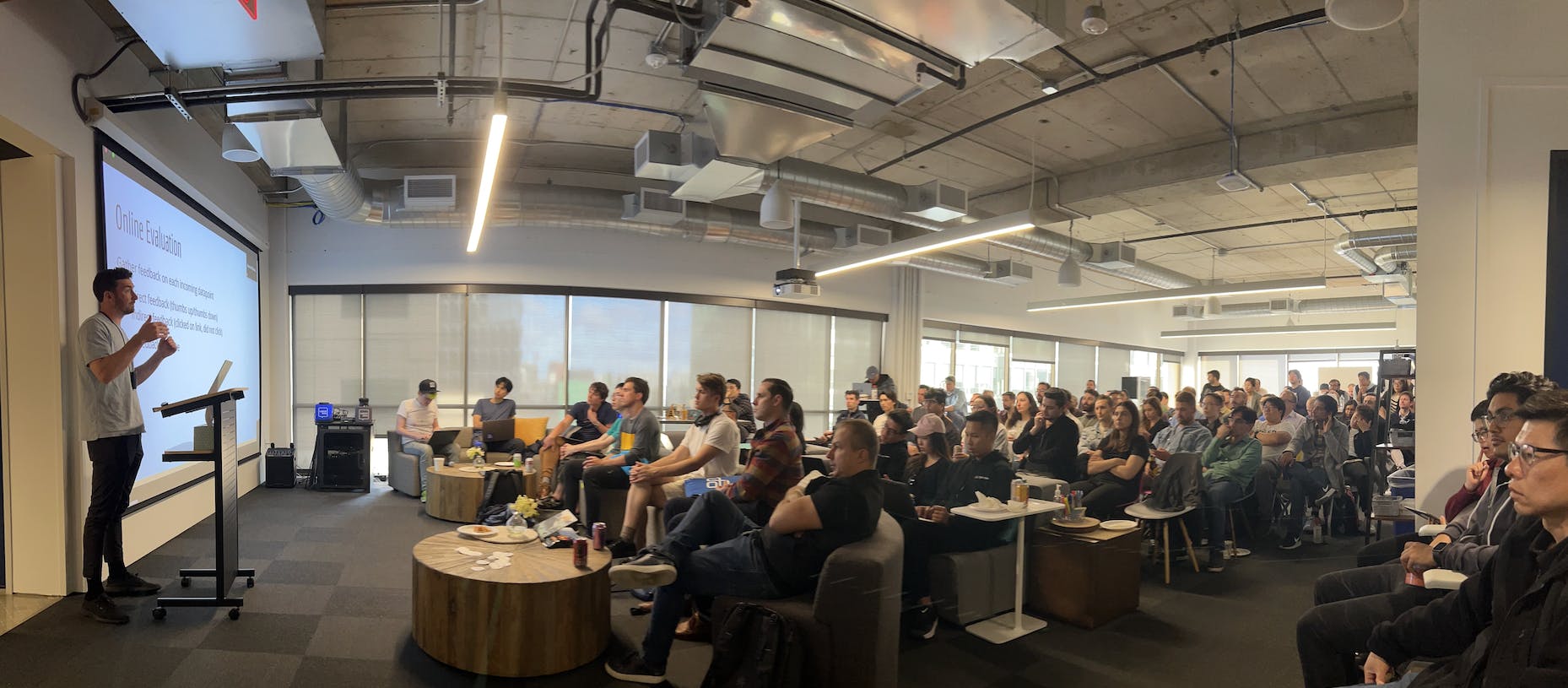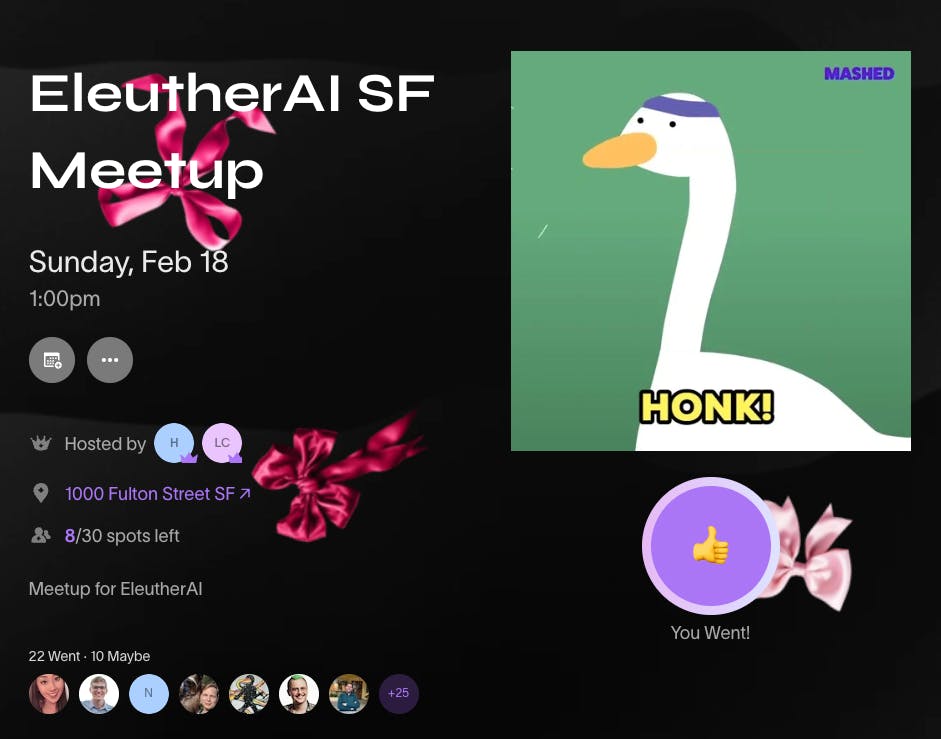How to Organize Meetups Good
This is meant as a Meetups oriented complement to How to Do IRL Conferences Good and is a subset of the broader How To Community genre. Read those for fuller context or other ideas! For more social meetups, see also: How to Manifest a Meetup
If you are reading this on email, know that this is a work-in-progress and we will update the live website version as we go along. Just shipping fast to get this out there.
Most companies think of meetups like this:

But this is a meetup:

And this is a meetup:
and this is too:


Rules of meetups
Rule 0: Do what you can sustain. Meetups live and die on the organizer's backs and the small core community that keep coming back and making it social and rewarding instead of wave after wave of faceless forgettable names.
- This rule is for the recurring, regularly scheduled, community oriented meetups only. Companies do do one-off meetups (sometimes also called "developer days" or "demo days" or "launch parties") but the ones that pull this off usually have a fair amount of social media pull anyway. If you have a company that can do this easily, it is preferable since the organization burden is lower.
Naming: you don't have to be too cute with naming. Have a clear name that resonates with your audience and run with it. The more you can definitively own an aspirational category outside your company name the better. E.g:
SF Python Meetup
SF Data Engineering Meetup
SF Open Source AI Meetup
Too "cute": SF "Bits and Bytes" meetup
Too "alcohol tied": SF "Models and Bottles" meetup
Theming: The most important thing to nail about the meetup is why people are gathering. There are two main reasons:
Famous guest/speakers: that people want to hear from
Worthy cause: that is a hot topic at work or people desperately
Timing: Thursday nights are very popular in major cities, because "well at least it's not Friday". This leads to overcrowding of meetups on Thursdays. This isnt necessarily a bad thing if you're a big name, but also something to note. Mondays, Tuesdays, Wednesdays are fine. Weekends good for longer events too.
- See if you can coincide your event with something bigger going in the city, eg. a major conference going on, where big names from out of town are visiting and therefore easier to snag
Format:
Traditional long talks: 25-45mins
Lightning talks: 5-10 mins each - the SF Demos & Chill club has a strict rule against presenting work or selling things and it works well.
- Note from Lee Robinson : "If the goal of the meetup is socialization then the 5-7 minute lightning talks are so much better."
Panel Interview - Thursday Nights in AI is often like this - great for the guest because no prep needed, but sometimes could be worse for the audience because of low info density
Marketing & Attendance:
Many meetups have the problem of getting people to hear about them. Here the key is to get on local event calendars - make friends with all local influencers and make sure that they either come by or just shout you out in their calendar recaps or so on
Some meetups have the fortune of being by a hot company or in a tech hub, and therefore have the opposite problem of too many people, and therefore:
screening people as they come in is helpful. Often screening out VCs, managing gender balance, just general vibe
Vercel ran an "invite-only" metastrategy for a long time where they would DM people they want to invite and the response rate would be higher because of the exclusivity - not sure this works for non-hot companies
It’s worth recruiting speakers that are diverse across many spectrums, ex. gender, ethnicity, age, education, etc. Diverse speakers attract diverse attendees, or in many subtle ways make it harder to be unintentionally offensive or exclusive of minorities. It may require notable effort but it results in a richer community. (thanks Will Klein)
Extending: recording meetup for online consumption basically gives you some extra option value at the cost of a little more work - most recorded meetups dont go anywhere, BUT some go viral because its a good talk or hot topic.
But even if your meetup gets like 300 views, which is low on YouTube, that's still 2-5x what you could get in person, and is nice collateral for inviting future guests to give the "vibe" of the meetup. There are also some folks who will NEVER attend your meetup but will speedrun thru your video at 2x, and these are often high value people you want to reach.
In general I encourage recording unless you really can't manage it. I don't really care about livestreaming except to the extent that it helps you "auto-upload" with no frills instead of fretting about editing and potentially forgetting to upload later on (this has definitely happened to any busy devrel and it sucks - streaming has a nice lack-of-optionality to it where the audience gives you a pass for poorer experience due to lack of editing).
Note from Lee Robinson : "Agree that live streaming isn't really worth it, but +1 to recording. Especially if you can set up a decent camera angle on the speaker". This lightly edited Vercel meetup talk got >100k views.
Recommended related reads
Both of the below are more "community meetup" oriented. If you know any notes/advice from people running more "coporate" oriented meetups, please get in touch.
Gathering notes from Maggie Appleton: "As an organiser, you have to deal with a mountain of crap... Your challenge is to setup enough systems and structures to shrink this mountain of crap to an acceptable level. My organising impulses are reasonably selfish, so if I'm too busy dealing with unpleasant people, logistics, and literal rubbish to enjoy myself at an event, that's probably the end of that community."
- includes other organization advice at the end, and some encouragement.
12 lessons from 5 years of running a tech meetupfrom Dave Kiss (see also the HN comments)
"I always try to host the meetups at a venue where people might be likely to hang out anyway, even if there wasn’t any event going on"
"Before the event day even comes, you need to paint the scene of what your guests will experience and what they’ll take home if they choose to spend the evening with your group. Try to think cinematically. Don’t just share the discussion topic — instead, describe the talk in more detail. Tell a story." - use AI art to make nice posters.
"If there’s one area where you can’t provide too much information, it’s the event description."
"Without fail, for free events, there’s a predictable dropoff of around 30% of all RSVPs." this is more like 40%-60% in San Francisco due to event dilution
"Ask each speaker to provide a testimonial about their experience."
Send reminder emails leading up to your event. I usually go with around 5 emails total
has a nice checklist of meetup supplies at the end.
